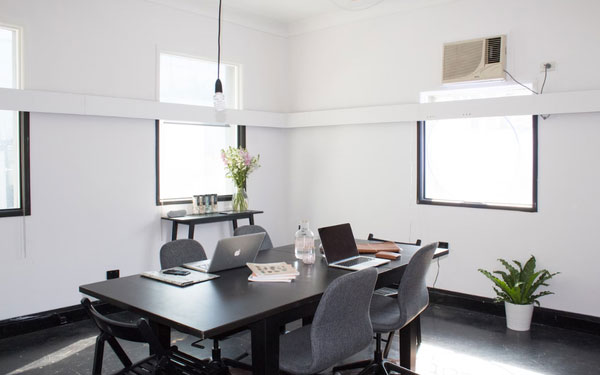A large proportion of French people spend more time during the week at the office than at home (excluding sleeping hours or periods of confinement). More than ever, it is necessary to adopt the right consumer habits for economic and, above all, environmental reasons. On average, an employee emits 514 kg of CO2 per year just because of the use of digital tools in the office. However, there are simple actions to reduce energy consumption and greenhouse gas emissions. Here are a few of them.
Heating and air conditioning
Reduce your heating consumption
Heating, generally used half the year, is responsible for 50% of energy consumption in the office.
According to the regulations, if the work performed does not require movement, and only mental activity, the office must be heated between 21°C and 24°C.
On the contrary, if the work requires movement, the ideal temperature so that the body does not need to adapt is 19°C.
Thus, heating set above 24°C is counterproductive. And reducing the heating by 1°C during the day can save up to 7% of total electricity.
It is also very useful to equip yourself with a thermostat. Indeed, according to the regulations, an unoccupied office only requires a temperature of 16°C. If, in addition, the office is unoccupied for more than 2 days, the heating must not exceed 8°C. If the building is well insulated, it may be economical to turn off the heating at night.
[Good to know]: The 1978 energy code provides for an average limit of 19°C for heating homes and business premises. In theory, offenders may even be fined €1,500.
This is an average – which can be achieved by reducing temperatures at night, for example – and not a maximum temperature not to be exceeded.
As individual additional radiators are very energy-intensive, it is strongly recommended to find the ideal temperature for everyone’s comfort and to ban these devices.
Finally, as soon as the outside temperature allows it, you should remember to turn off the heating, especially when starting the air conditioning.
Better use of air conditioning to maximize energy savings
Air conditioning is also a major source of energy consumption and often a big debate within offices. Some cannot do without it, others complain about it. It is difficult to find a setting temperature that suits everyone. But knowing the following main principles can help to converge:
- First of all, it is necessary to limit the use of air conditioning as much as possible.
- It is then possible to cool and ventilate the premises by opening the windows during the day when the outside temperature allows it. Do not hesitate to do this at night if possible.
- If the air conditioning is on, it should not be set with a difference of more than 4°C with the outside temperature in order to avoid thermal shock.
- If the outside temperature is above 30°, it is also not recommended to go below 26°C.
Use of digital tools
Consume less by using the Internet
According to ADEME, a French person makes an average of 949 internet searches per year. Cumulatively at the national level, these represent an average of 287,600 tonnes of CO2 per year. That is the equivalent of 1.5 million km travelled by car. However, these days it is difficult to do without the internet. We must therefore improve the way we use it. In order to reduce its ecological impact, it is preferable to:
- go directly to the desired site without going through a search engine by:
- Searching in the history,
- Pasting directly the URL address of a site link,
- Or by saving frequently used sites in favorites
- To do effective searches with relevant keywords,
- To close unused tabs, especially social networks,
- To use an eco-friendly search engine such as ecosia, ecogine – French engine – or lilo, which use their profits to finance sustainable development projects (reforestation for ecosia) and offset their carbon emissions.
Reducing the environmental impact of email production
ADEME estimates that sending a 1 MB email consumes 15 g of CO2. Thus, spam worldwide would consume as much energy as 2 million American homes. It is once again unthinkable to do without using your mailbox in the world of work, but it is possible to reduce this consumption, thanks to a few simple actions:
- Install anti-spam software.
- Delete emails regularly to limit their storage.
- Select recipients carefully when sending (avoid using the “reply to all” option for example).
- Delete attachments from emails received or sent.
- Create lightweight and easily accessible attachments.
Use of office equipment
Optimizing energy consumption related to lighting
Lighting represents about 20% of a company’s energy bill. However, it is very easy to optimize the use of lighting:
- Use LED or low-energy bulbs. They consume 4 to 5 times less energy than conventional bulbs.
- Place offices to have as much natural light as possible.
- Turn off all lights when you are away.
- Use outdoor lights with a presence sensor to optimize their use as much as possible.
Improving the use of computers and printers
Even if electricity in France emits little CO2 due to its mainly nuclear production, limiting consumption means not having to use fossil fuel power plants. The issue of nuclear waste and the depletion of uranium resources is pushing us to turn to renewable energies. However, to live with 100% renewable electricity, we would have to drastically reduce our consumption. However, computers, printers and photocopiers are an integral part of office consumption. To optimize their use, we should:
- Turn off machines that do not need to run at night. In standby mode, a computer consumes between 20 and 40% of its normal consumption.
- Turn off screens as often as possible.
- Unplug chargers from sockets if they are not needed.
- Equip yourself with a multifunction device: printer, photocopier and scanner.
- Print only when necessary, on both sides, by selecting the pages that are really needed.
- Unplug the printer at night if not in use.
And iQspot in all this?
iQspot is the tool that will allow you to:
- Identify the items on which savings can be made,
- Concretely measure the impact of all your actions in terms of reducing consumption,
- And share/report your performance information, in particular those mandatory under the Tertiary Decree that came into force this year.
Knowledge is power. So, if you have decided to change your behavior at the office to improve your energy performance, don’t hesitate: contact us!




